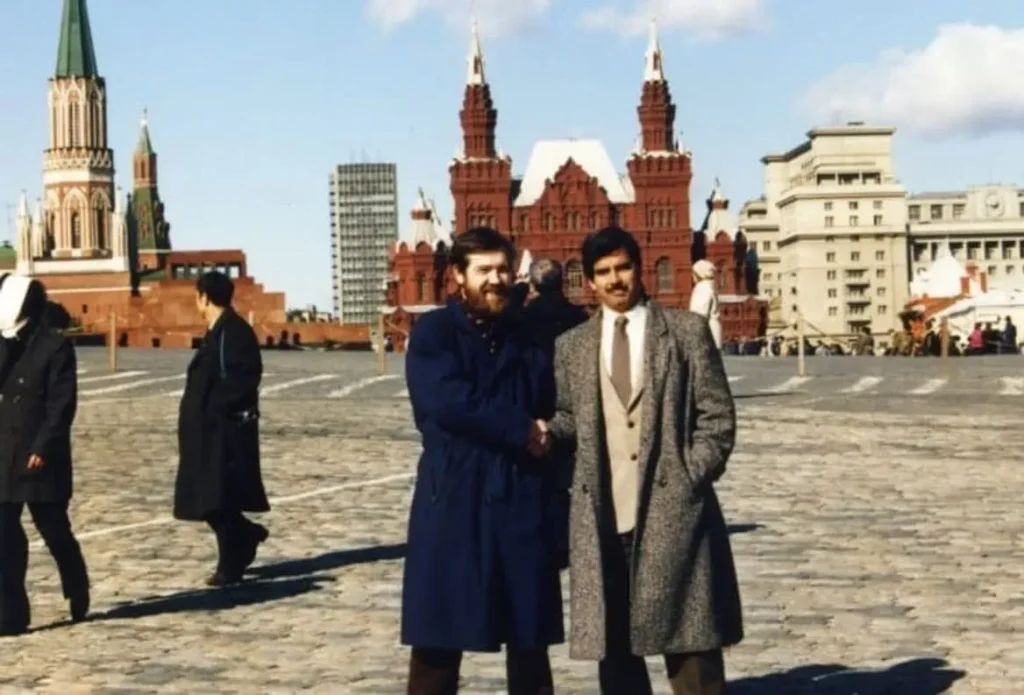Henk Rogers, an iconic game developer, is best known for his groundbreaking role in bringing Tetris to the West, reshaping the landscape of gaming forever. With a passion for innovation that began at the 1988 Consumer Electronics Show, Henk recognized Tetris as “the perfect game” that captivated players worldwide. His adventures, including maneuvering past the KGB to secure the rights to this beloved puzzle game, are vividly depicted in the recent Tetris movie, showcasing both his entrepreneurial spirit and unique journey. While he gained fame for his contributions to gaming, Rogers has recently shifted his focus towards tackling climate change, demonstrating that his drive extends beyond just game development. A fascinating blend of success in gaming history and a commitment to environmental advocacy, Henk Rogers’s story reminds us of the power of creativity in all its forms.
The journey of Henk Rogers, a pivotal figure in video game history, illustrates the interplay between creativity and courage. Known primarily for his groundbreaking work with Tetris, Henk’s tale transcends simple gaming narratives as it delves into international intrigue, facing the KGB and navigating complex rights issues. His transition from gaming mogul to climate change activist highlights the dynamic nature of his endeavors, emphasizing not just his game development skills but also his commitment to a sustainable future. This transformative path signifies a shift from constructing virtual worlds to preserving the real one. By championing clean energy through his Blue Planet Foundation, Rogers embodies the spirit of innovation and responsibility that defines today’s leaders.
The Impact of Tetris on Gaming Culture
Tetris, since its inception, has revolutionized the gaming industry and established itself as a cultural phenomenon. This iconic puzzle game introduced players to the concept of an endless challenge, where simple mechanics lead to a profound gaming experience. The gameplay, characterized by the required precision and strategic placement of falling blocks, not only captivated millions but also laid the groundwork for various genres that followed. The influence of Tetris is palpable; it has inspired countless game developers to innovate and create intriguing gameplay mechanics, subsequently making its mark on countless titles, from casual mobile games to major console releases.
Additionally, Tetris’s legacy exemplifies the way a single game can shape the trajectory of an entire industry. With its addictive nature and universally appealing design, it has transcended cultural and geographical barriers. Tetris taught developers about engaging game mechanics while emphasizing that accessibility is key to broad appeal. This lesson has remained vital, influencing new generations of designers who strive to emulate its success while exploring advanced graphics and narrative techniques. As gameplay evolves, Tetris remains an enduring touchstone that both gamers and developers turn to for inspiration.
Henk Rogers: The Man Behind Tetris’s Global Success
Henk Rogers, an influential game developer, played a pivotal role in bringing Tetris to Western audiences and has since become synonymous with the game. His adventurous spirit and determination allowed him to navigate the complex web of copyright intricacies during the Cold War, ultimately securing the distribution rights for one of the most beloved games in history. Rogers’s journey to acquire Tetris rights from the KGB-sanctioned Elektronorgtechnica (Elorg) showcases not only his tenacity as a businessman but also his deep understanding of the gaming landscape. His ability to see the potential in Tetris set the stage for its global success.
Rogers’s contributions to the gaming world extend far beyond Tetris. His earlier work, including founding Bullet-Proof Software, significantly shaped the RPG genre in Japan. By innovating the concept of health bars and integrating role-playing elements into games, Rogers influenced notable developers like Shigeru Miyamoto. Rogers’s multifaceted journey, including his transition into climate change activism, demonstrates his passion for making the world a better place, both through gaming and beyond. Each chapter of his life reflects his boundless energy and creativity, establishing him as a key figure in the narrative of modern gaming.
The Tetris Movie: Fact or Fiction?
The recent adaptation of Henk Rogers’s life story into a Tetris movie sparked both excitement and debate among fans and film critics alike. While the film captures the essence of the struggle and determination behind securing Tetris’s rights, it also incorporates dramatic license, leading to some factual inaccuracies. Scenes depicting KGB interrogations and the high-stakes negotiations provide a thrilling cinematic experience, but they also blur the line between reality and creative storytelling. Rogers himself expressed concerns about certain fictionalized aspects, emphasizing that while entertainment is important, authenticity remains paramount.
Yet, despite these dramatizations, the film successfully highlights the overarching theme of resilience amidst challenges and the unforeseen paths that can lead to monumental successes. The dramatic retelling of Tetris’s history offers a glimpse into the turbulent era of the late 1980s, as well as showcasing the unique relationship formed between Rogers and Pajitnov. Fans of Tetris and the gaming community as a whole can appreciate how this story, whether embellished or not, reflects the indomitable spirit of creators who dare to dream big, navigating systemic hurdles to share their vision with the world.
The Role of the KGB in Tetris’s History
During Henk Rogers’s quest to secure the rights to Tetris, the shadow of the KGB loomed large, representing a significant obstacle in his path. The Soviet-era intelligence agencies were notorious for their scrutiny of foreign visitors, and Rogers found himself under close observation as he maneuvered through bureaucratic layers to meet with Alexey Pajitnov. This tense backdrop not only adds a layer of intrigue to the history of Tetris but also encapsulates the complex political landscape of the time. The KGB’s role in this narrative provides insight into the significant risks that creators like Rogers faced in their quest to bring innovative ideas out of the Soviet Union.
Rogers’s experience with the KGB exemplifies how the world of gaming does not exist in a vacuum, as external political contexts can profoundly impact creative endeavors. His ability to navigate this treacherous terrain while maintaining focus on his end goal demonstrates immense courage and tenacity. Ultimately, Tetris’s emergence into the global market amid such challenges stands as a testament to the resilience of those involved in its journey, reminding us that great games are often forged under challenging circumstances.
Tetris and its Lasting Influence on Game Development
The long-lasting impact of Tetris on game development cannot be overstated, as it has shaped the way games are designed and perceived today. Its simple yet addictive mechanics proved that even the most straightforward concepts could lead to immense success. Tetris’s design principles, which focus on spatial awareness and pattern recognition, have inspired a multitude of developers to create games that emphasize similar logic and skill-based challenges. This influence can be seen across various platforms, from mobile devices to VR experiences, showcasing Tetris as an evergreen model of game design.
Moreover, Tetris’s integration into various media further highlights its significance in the gaming world. The game has appeared in multiple adaptations, including Tetris 99 and Tetris Effect, each a testament to its adaptability and relevance. By learning from Tetris’s formula, developers can explore new ways to engage players and rethink gameplay mechanics. Tetris’s enduring popularity serves as a reminder that sometimes, simplicity transcends complexity, encouraging creators to innovate while respecting the roots of gaming culture.
From Gaming to Global Activism: Henk Rogers’s New Mission
After a near-fatal heart attack in 2005, Henk Rogers experienced a transformative shift in his priorities, leading him away from gaming and towards climate change advocacy. Drawing upon his entrepreneurial spirit, he founded the Blue Planet Foundation, targeting clean energy initiatives in Hawaii. Rogers’s transition from game developer to climate crusader illustrates how personal experiences can ignite a passion for activism. By leveraging the skills he honed during his time in the gaming industry, he’s effectively rallying support for sustainable initiatives, demonstrating that the ability to inspire and mobilize can extend beyond digital realms.
Rogers’s work highlights the growing intersection between technology, entrepreneurship, and environmental stewardship. By combining his innovative mindset with a commitment to combating climate change, he aims to promote a healthier, more sustainable future. His dedication to this cause reflects a broader trend of video game developers harnessing their platforms to influence positive societal change, reminding us that the principles of creativity and resilience can drive progress far beyond the confines of gaming.
The Friendship Between Henk Rogers and Alexey Pajitnov
At the heart of the Tetris saga is the enduring friendship between Henk Rogers and its creator, Alexey Pajitnov. Their relationship blossomed amid high-stakes negotiations with the KGB, which adds a compelling narrative element to the story of Tetris’s rise to fame. This friendship underscores the importance of collaboration and empathy in creative partnerships, as their combined efforts ultimately led to the establishment of the Tetris Company, allowing Pajitnov to finally share in the success of his titular creation. Their respect for each other’s talents has fostered a collaborative spirit within the gaming industry that resonates even to this day.
Through shared experiences and mutual respect, Rogers and Pajitnov exemplify how connections forged during challenging times can lead to profound creativity and business success. Their ongoing partnership reflects a model for others in the industry, promoting a culture of collaboration where developers uplift one another. Together, they continue to inspire generations of new game makers by showing how unity and shared vision can bring about innovation that transcends mere entertainment.
The Evolution of Tetris: New Forms and Experiences
Tetris has evolved significantly since its original release, adapting to new technologies and platforms while maintaining its fundamental spirit. The introduction of various iterations and adaptations has not only revitalized interest in the game but has also allowed it to reach new audiences. Innovations like Tetris Effect have transformed how players engage with this classic puzzle, incorporating audiovisual elements that heighten the experience. This evolution demonstrates the flexibility of Tetris’s core mechanics, which can be reimagined to fit contemporary gaming trends while retaining the essence that made it beloved.
The ongoing development of Tetris also speaks to the nature of the gaming industry itself, where adaptations and innovative reboots are crucial to keeping classic titles relevant. By embracing modern technologies, including VR and mobile platforms, Tetris remains a key player in the gaming landscape. This continuous reimagining ensures that both new and veteran players can enjoy the game in ways that resonate with today’s technological advancements, proving that even timeless concepts can evolve and adapt to modern times.
The Legacy of Tetris in Addressing Global Challenges
The legacy of Tetris extends beyond the realm of gaming; its cultural relevance has inspired discussions on various global challenges, such as climate change. The simple yet captivating nature of Tetris illustrates fundamental concepts of organization and balance, principles that can apply to broader societal issues. Just as players strive to create a cohesive structure by fitting blocks together, society must work collaboratively to tackle pressing environmental concerns. Henk Rogers, through his climate activism, echoes this sentiment, demonstrating how lessons learned from Tetris can contribute to building a sustainable future.
Moreover, Tetris serves as a metaphor for resilience, emphasizing that even the simplest actions can lead to significant impacts. As players face challenges, they learn to adapt and strategize, skills that are vital in addressing today’s global issues. Engaging with Tetris can inspire individuals to approach problems with creativity and persistence, fostering a community-oriented mindset necessary for collective action against challenges like climate change. Its legacy, therefore, continues to resonate, reminding us that gaming can not only entertain but also inspire meaningful change.
Frequently Asked Questions
Who is Henk Rogers and what is his connection to Tetris?
Henk Rogers is a game developer and entrepreneur best known for acquiring the distribution rights to Tetris from the Soviet Union in the late 1980s. His efforts spearheaded the game’s launch in the West, making Tetris a global phenomenon.
What was Henk Rogers’ experience with the KGB while dealing with Tetris?
During Henk Rogers’ trip to Russia in 1988 to secure Tetris distribution rights, he was monitored by the KGB. He faced intense interrogation but managed to negotiate with Tetris’ creator, Alexey Pajitnov, under precarious circumstances.
What role did Henk Rogers play in the creation of the Tetris movie?
Henk Rogers’ life story involving Tetris set the stage for the Apple TV+ film. He was involved in the production discussions and shared insights about his experiences, although he noted that some elements of the movie took creative liberties.
How did Henk Rogers influence the gaming industry beyond Tetris?
Before his involvement with Tetris, Henk Rogers created the role-playing game The Black Onyx, which introduced key mechanics like health bars to RPGs. This game significantly influenced other developers, including the legendary Shigeru Miyamoto of Nintendo.
What are Henk Rogers’ current initiatives regarding climate change?
After shifting his focus from game development, Henk Rogers now campaigns against climate change through the Blue Planet Foundation, advocating for renewable energy and sustainable practices in Hawaii to achieve a cleaner future.
How does Henk Rogers describe Tetris as a game?
Henk Rogers has described Tetris as ‘the perfect game’, noting its simple yet addictive qualities that kept players coming back. He recognized its uniqueness at its debut, setting the foundation for its later success.
What is the significance of Henk Rogers’ book about Tetris?
In his book ‘The Perfect Game: Tetris, from Russia With Love’, Henk Rogers provides a detailed narrative of his experiences acquiring the Tetris rights, correcting misconceptions presented in popular media and celebrating the game’s legacy.
How did Henk Rogers impact Tetris’ creator, Alexey Pajitnov’s, life?
Henk Rogers not only secured the rights to Tetris but also established a lasting friendship with Alexey Pajitnov, helping him gain recognition and financial reward after years of working on the game without compensation.
| Key Point | Details |
|---|---|
| Henk Rogers and Tetris | Rogers first encountered Tetris at the 1988 Las Vegas CES and described it as ‘the perfect game’. |
| Acquisition Journey | Rogers secured distribution rights from Elorg, managing to negotiate through KGB surveillance. |
| Relationship with Alexey Pajitnov | Rogers built a friendship with the game’s creator Pajitnov, with whom he later established the Tetris Company. |
| Film Adaptation | Rogers’ life story was dramatized in a film, but he felt it contained many inaccuracies. |
| Shift to Climate Activism | After a heart attack in 2005, Rogers shifted focus from gaming to climate change advocacy through the Blue Planet Foundation. |
Summary
Henk Rogers has become a significant figure not just in the gaming industry with his role in popularizing Tetris, but also in the fight against climate change. His journey, from acquiring Tetris amidst KGB intrigue to shifting his focus towards environmental activism, demonstrates how passion can drive impactful change. As a testament to his efforts, the Tetris Company now works alongside him and Pajitnov to keep their creation relevant, while Rogers dedicates his time to sustainable initiatives. This dual narrative of gaming innovation and environmental stewardship makes Henk Rogers a remarkable presence in our contemporary landscape.



